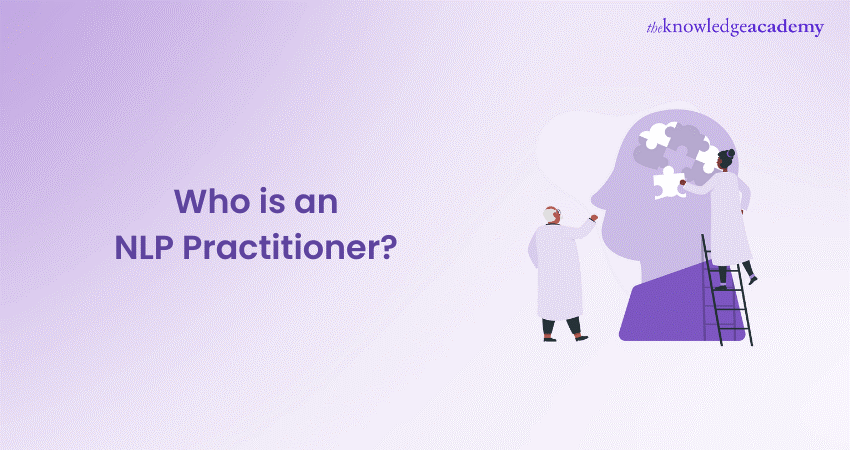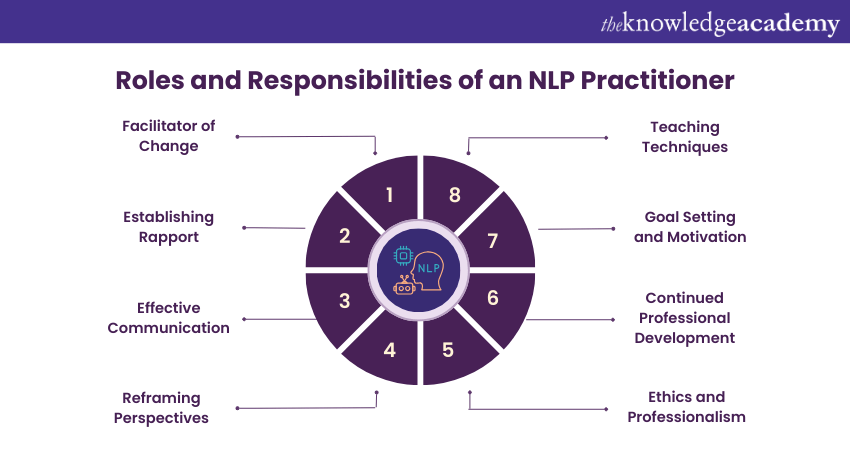We may not have the course you’re looking for. If you enquire or give us a call on +44 1344 203 999 and speak to our training experts, we may still be able to help with your training requirements.
We ensure quality, budget-alignment, and timely delivery by our expert instructors.

Do you find yourself stuck in a cycle, wanting to change a habit, boost your confidence, or just get out of your own head? Maybe you’ve tried self-help books, podcasts, and even advice from friends, yet nothing seems to stick. That’s where an NLP Practitioner comes in. These are trained professionals who help people shift unhelpful thought patterns, build better habits, and finally move forward.
Table of Contents
1) Who is an NLP Practitioner?
2) What Does an NLP Practitioner do?
3) How to Qualify as an NLP Practitioner?
4) Profile of a Typical NLP Practitioner
5) Skills of an NLP Practitioner
6) Roles and Responsibilities of an NLP Practitioner
7) How can NLP Practitioners Help you?
8) Is an NLP Practitioner a Therapist?
9) What is the Difference Between NLP Practitioner and Master Practitioner?
10) Conclusion
Who is an NLP Practitioner?
An NLP practitioner utilises Neuro-Linguistic Programming (NLP) techniques to support individuals in achieving goals and overcoming challenges. NLP encompasses tools that enhance Communication Skills, relationships, and personal development. Practitioners aid in transforming limiting beliefs, fostering effective communication, goal setting, fear/phobia alleviation, relationship improvement, and enhancing self-esteem.
NLP Practitioners operate in diverse settings, including coaching, therapy, education, and sales/marketing, addressing individual, group, and organisational needs. From coaching for personal growth and treating mental health concerns to applying NLP in educational or business contexts, practitioners play a versatile role in facilitating positive change and improvement.
What Does an NLP Practitioner Do?
An NLP (Neuro-Linguistic Programming) expert teaches people different ways to think, speak and perform actions to reach both work and personal success. They assist their clients in finding their limits and helping them replace negative thinking while learning ways to communicate better.
Through NLP methods like anchoring mirroring and visualising practitioners enable people to face fears gain self-assurance and reach their targets. They study the links between how people use language and think to shape their behaviour and emotions.
NLP professionals assist people in specific domains including these key areas.
a) Personal development for boosting confidence and motivation
b) NLP experts show people ways to replace harmful emotional connections with new positive patterns.
c) A better connection with others boosts our personal relationships
d) The therapy helps clients manage distress and overcome their emotional uncertainty.
e) People find new paths to reach their professional and personal targets by overcoming personal obstacles.
How to Qualify as an NLP Practitioner?
Thinking about becoming an NLP Practitioner? Here are the simple steps to get you started on the right track:
1) Pick the Right Training Course
First things first, you must choose a course that's accredited by a trusted body like Association for Neuro Linguistic Programming (ANLP) or International NLP Trainers Association (INLPTA). This ensures you're learning from professionals who follow recognised standards.
2) Learn the Core Skills
A good course will teach you the basics of NLP, including techniques like reframing, anchoring, and effective communication. You’ll also explore how thoughts and language shape behaviour.
3) Practise What You Learn
It’s not just theory; you will get plenty of chances to practice NLP techniques with others. This hands-on experience is where the real learning happens.
4) Complete the Assessments
To get certified, you will usually need to pass some practical and written tasks that show you understand and can apply what you’ve learned.
5) Get Certified
Once you have passed, you’ll earn your NLP Foundation and Practitioner Certificate and you’re ready to start helping others make real changes.
Create real change from day one – join our Introduction to NLP Course now!
Profile of a Typical NLP Practitioner
After training in NLP practices professionals usually bring their coaching psychology counselling or business development expertise to the role. NLP practitioners use their training to assist people in multiple industries such as therapy sessions, sales roles, leadership development and personal growth.
Common Characteristics of an NLP Practitioner:
a) Strong communication and listening skills
b) They know how to detect and understand unspoken signs from body language.
c) Empathy and an understanding of human behaviour
d) NLP practitioners focus on teaching NLP methods like reframing thinking, establishing mental connections using anchors and building effective connections.
e) Keep moving forward toward your desired life successes
Skills of an NLP Practitioner
Now that we know the NLP Practitioner meaning, we will move on to exploring the skills they possess. When considering CBT vs NLP, it is essential to understand how an NLP Practitioner applies various techniques to facilitate personal change and transformation. An NLP Practitioner possesses a range of core skills and NLP Techniques that enable them to guide individuals toward achieving their goals effectively. These skills include:
a) Effective Communication: NLP Practitioners are skilled in understanding and utilising verbal and non-verbal communication cues to establish rapport and enhance the effectiveness of their interactions. For those interested in delving deeper into communication, consider exploring Types of Communication Skills and Principles of Communication.
b) Anchoring: NLP Anchoring is a technique that associates specific emotional states with external stimuli. Anchoring involves associating specific emotions or states with sensory stimuli. NLP Practitioners guide individuals in creating and utilising anchors to access resourceful states such as confidence, relaxation, or motivation in different contexts.
c) Reframing: It involves changing the meaning or interpretation of an experience to create a more empowering perspective. NLP Practitioners help individuals reframe their beliefs, thoughts, and past experiences, enabling them to overcome obstacles and achieve their desired outcomes.
d) Rapport Building: It is a fundamental skill used by NLP Practitioners to establish trust, understanding, and connection with their clients. Practitioners create a comfortable and supportive environment for personal growth and change through mirroring, matching, and pacing techniques.
Want to transform your life with NLP? Sign up for our NLP Foundation and Practitioner Training Course today!
Roles and Responsibilities of an NLP Practitioner
Now, let's explore their roles and responsibilities. Here are some of the key roles and responsibilities of NLP Practitioners:

a) Facilitator of Change: Your core duty involves leveraging NLP techniques to facilitate positive transformations, aiding clients in overcoming limitations and achieving desired outcomes.
b) Establishing Rapport: Establishing a foundation of trust is paramount. You create a secure space where clients feel at ease exploring their thoughts, emotions, and beliefs.
c) Effective Communication: Possessing excellent communication skills, you actively listen, utilise effective language patterns, and interpret non-verbal cues through the NLP Communication Model, fostering enhanced understanding.
d) Reframing Perspectives: Guiding individuals in reframing perspectives, you challenge limiting beliefs, enabling clients to overcome obstacles and embrace empowering mindsets.
e) Teaching Techniques: Imparting practical NLP techniques such as visualisation, anchoring, and timeline therapy empowers individuals to manage emotions, set goals, and enhance overall well-being.
f) Goal setting and Motivation: Guiding clients in establishing meaningful goals, an NLP Engineer Job Description emphasizes providing continuous motivation and support to foster personal and professional growth.
g) Continuous Professional Development: Committed to your growth, you engage in continuous learning, attending workshops and staying abreast of NLP Outcomes advancements to deliver the highest quality service.
h) Ethical and Professional Conduct: Upholding ethical standards, maintaining confidentiality, and prioritising clients' well-being demonstrate your commitment to ethical and professional practice.
Turn insights into lasting impact – sign up for our NLP Master Practitioner Training today!
How Can NLP Practitioners Help You?
Here’s how the NLP Practitioners can help you:
a) Help You Break Old Habits: From negative thinking to fear of failure, NLP Practitioners can help you recognise and change the mental patterns that are holding you back.
b) Build Confidence and Self-Belief: They will work with you to boost your confidence, helping you approach situations, like interviews or presentations with a calm and focused mindset.
c) Improve How You Communicate: Either at work or in your personal life, NLP techniques can help you express yourself more clearly and understand others better.
d) Teach You to Manage Stress and Emotions: If you often feel overwhelmed or anxious, NLP can give you tools to stay grounded and in control, even in tough situations.
e) Support You in Reaching Your Goals: Practitioners help you set clear goals and build the right mindset to achieve them; without second-guessing yourself along the way.
Is an NLP Practitioner a Therapist?
Described here is the difference between licensed therapists and NLP practitioners despite their shared goal to support personal growth. A therapist treats severe psychological matters, but an NLP practitioner uses thought and behaviour transformations to aid personal development.
What is the Difference Between an NLP Practitioner and a Master Practitioner?
An NLP Practitioner teaches basic means to change how clients think, but an NLP Master Practitioner possesses advanced abilities to bring about significant and profound transformation. Master practitioners use NLP techniques at their highest level of skill.
Conclusion
An NLP Practitioner isn’t just someone who understands how the mind works; they help you take control of it. From breaking bad habits to boosting confidence, their tools can lead to real, lasting change. If you’re ready to shift gears and move forward, this could be your next step.
Take control of your mind and transform your life with NLP by joining our Neuro-Linguistic Programming Courses today!
Frequently Asked Questions
Can NLP Be Integrated into Existing Trainings for Employees?

Certainly, NLP can seamlessly integrate into existing trainings programs for employees. Its versatile techniques enhance communication, leadership, and interpersonal skills, fostering a positive work environment. NLP empowers employees to overcome challenges, improve performance, and achieve personal and professional growth.
How Can NLP Be Used to Improve Sales and Client Relationships?

NLP enhances sales and client relationships by improving communication, building rapport, and understanding client needs. Techniques like mirroring and pacing create a connection, while language patterns influence perceptions. NLP empowers sales professionals to adapt strategies, overcome objections, and create positive interactions.
What are the Other Resources and Offers Provided by The Knowledge Academy?

The Knowledge Academy takes global learning to new heights, offering over 3,000 online courses across 490+ locations in 190+ countries. This expansive reach ensures accessibility and convenience for learners worldwide.
Alongside our diverse Online Course Catalogue, encompassing 19 major categories, we go the extra mile by providing a plethora of free educational Online Resources like News updates, Blogs, videos, webinars, and interview questions. Tailoring learning experiences further, professionals can maximise value with customisable Course Bundles of TKA.
What is The Knowledge Pass, and How Does it Work?

The Knowledge Academy’s Knowledge Pass, a prepaid voucher, adds another layer of flexibility, allowing course bookings over a 12-month period. Join us on a journey where education knows no bounds.
What are the Related Courses and Blogs Provided by The Knowledge Academy?

The Knowledge Academy offers various NLP Courses, including NLP Foundation and NLP Master Practitioner. These courses cater to different skill levels, providing comprehensive insights into NLP Dissociation Techniques.
Our Business Skills blogs cover a range of topics related to NLP, offering valuable resources, best practices, and industry insights. Whether you are a beginner or looking to advance your NLP skills, The Knowledge Academy's diverse courses and informative blogs have you covered.
Upcoming Business Skills Resources Batches & Dates
Date
 Neuro Linguistic Programming
Neuro Linguistic Programming
Fri 16th May 2025
Fri 18th Jul 2025
Fri 19th Sep 2025
Fri 21st Nov 2025






 Top Rated Course
Top Rated Course



 If you wish to make any changes to your course, please
If you wish to make any changes to your course, please


